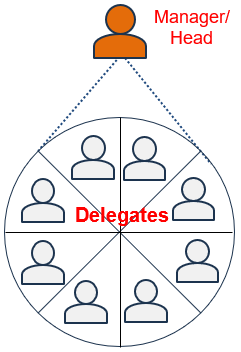| Copyright © 2024 Prem Kamble |
|
Art of Delegating - My Best Practices |
| Related Articles |
|
Summary
Introduction
Delegation reflects your ability to take risks and your trust in people. Many individuals become anxious after delegating, either offering unsolicited suggestions or continually checking on progress.
Delegation is a fundamental character trait that necessitates comfort in entrusting tasks to others and the ability to relax post-delegation. It also reflects your ability to take risks and your trust in people. However, many individuals become anxious after delegating, either offering unsolicited suggestions or continually checking on progress. This behaviour can be easily observed in a scenario where one struggles to trust a driver behind the wheel, constantly monitoring their actions for potential mishaps. If you can sleep peacefully when your driver is driving, you are possibly a good delegator. Throughout my managerial career, I took pride in designing and implementing delegation strategies that fostered peace, comfort and efficiency for both myself, the delegator and my project managers on whom I delegated responsibilities (hereinafter referred to as 'delegates'). Delegation Strategy for Quick Problem ResolutionWrite to Me | Comments | Related Articles | Top In my first managerial role in 1985, despite having less than 5 years of experience, I was awarded the formidable task of establishing a computer department from scratch for a group of companies. This involved developing and implementing all applications from the ground up. With only two inexperienced programmers at my disposal, I entrusted them with full project responsibilities. What was most noteworthy was the strong rapport and delegation strategy we built, enabling them to discern when to act autonomously and when to involve me. Consequently, emergency calls and escalations to me requiring my intervention were rare, highlighting the effectiveness of our collaboration. I received late night emergency call just once in 5 years – not due to process failure but due to hardware failure. Fortunately, we had comprehensive backups in place, allowing us to swiftly restore operations (Please see real success stories at Ref. R1 and R2). In a subsequent role, I oversaw a team of over 150 IT professionals, with five project managers reporting directly to me. Operating across multiple shifts, my project managers often had to resolve issues during unconventional hours from their homes. I witnessed their unwavering dedication and resourcefulness, as they adeptly managed challenges from home and promptly updated me the following morning. I never had to exert pressure on them to act; instead, empowered by their autonomy, they navigated challenges seamlessly, fostering a culture of self-motivation and accountability. The foundation of successful delegation rests on building a robust rapport and mutual understanding between the manager and delegates or subordinates. This understanding revolves around the ability to differentiate between situations where delegates can autonomously take action and critical situations when it is essential to involve the manager before proceeding. Our strong understanding developed because of some key factors. How these factors remained the cornerstone of our exceptional delegation strategy is the crux of this story. We will delve into these key factors for effective collaboration and delegation in the next few sections. Categories of Delegate's ActionsWrite to Me | Comments | Related Articles | Top
The key to success of this strategy lay in being able to correctly identify the category of issue and act accordingly. An error in categorisation of the issue could also be disastrous.
The job of any delegate, particularly the senior delegates, mirrors that of the manager, involving decision-making and taking action to address departmental or client issues. The actions required of delegates can be classified into three categories as follows:
The success of delegation strategy hinges on accurately identifying the category of the issue and responding accordingly. An error in categorization could lead to disastrous outcomes. Again, your risk-taking ability is tested here. Initially you need to take a few calculated risks to establish a rapport. Over time, a perfect mutual understanding developed between me and the delegates. My project managers possessed autonomy in decision-making on certain matters, discerning when decisions could be made independently, when consultation with me was necessary and when decisions had to be deferred to me. The perfect understanding resulted in the following benefits:
Defining ObjectivesWrite to Me | Comments | Related Articles | Top A critical component of our delegation strategy was the unequivocal definition of not only the departmental objectives, but also project objectives, aligning them with the company's overarching goals. When embarking on a new project, my initial step was to outline its business objectives meticulously, steering clear of trivial aims such as workforce or operational reductions. Instead, these objectives were crafted to yield tangible business benefits in line with the company's broader mission [R2]. Clear objectives served as guiding principles, empowering delegates to make informed decisions that advanced organizational objectives. With clear objectives in place, delegates could navigate decision-making processes more effectively. When faced with multiple courses of action to resolve issues, they could readily discern the option that best contributed to departmental or project objectives. This clarity empowered delegates to make independent, informed decisions, minimizing the need for my intervention to steer them towards the right choice. Promoting OwnershipWrite to Me | Comments | Related Articles | Top Fostering a sense of ownership and collective responsibility played a pivotal role in strengthening our delegation framework. In each project, I emphasized to my team that I was an integral part of our collective effort (Fig. 1a), not merely an overseer managing from the sidelines (Fig. 1b) [Real story at R5, R6]. I reassured the project managers in my team that I bore full accountability for the project's outcome, whether it led to success or failure. In our team dynamic, success was celebrated collectively, while failure was equally shared among all team members, myself included.

Fig. 1a: Manager as a part of the team 
Fig. 1b: Team with Manager Supervising
Fig. 1: Logical Team Structures
In Fig. 1a, the manager is part of the team, simply performing a different role. In Fig. 1b, the manager is detached from the team.
I made it clear that no individuals, especially Project Managers, would be made scapegoats for failure. Instead, we embraced a culture of shared responsibility and collaboration
I made it clear that no individuals, especially Project Managers, would be made scapegoats for failure. Once responsibilities were delegated, there was no room for finger-pointing; instead, we embraced a culture of shared responsibility and collaboration. By aligning myself with the project team, I provided leaders in my team with unwavering support and acknowledged our joint accountability for project outcomes. This approach alleviated the pressure on Project Managers, empowering them to take calculated risks without the fear of bearing sole blame [R3, R4 . Refer to the sections titled "Lessons Learnt" in both cases]. Freedom To Work, Less SupervisionWrite to Me | Comments | Related Articles | Top I firmly believed in empowering IT professionals with autonomy and trust, rather than micromanaging or driving them. They need no supervision and monitoring, they need trust. Given meaningful tasks and autonomy, they demonstrated remarkable dedication and initiative, surpassing expectations and delivering projects on time [R7 ]. See articles on how people skills were utilised to successfully complete all projects on time. [R1, R5, R6] Implications in Personal LifeWrite to Me | Comments | Related Articles | Top The principles of effective delegation extend beyond professional realms and find resonance in personal relationships, particularly within families. Clear delineation of roles and responsibilities, coupled with mutual trust and accountability, fosters harmonious relationships characterized by shared ownership and resilience in the face of challenges. Just as in professional settings, success and failure are collective endeavours, reflecting the spirit of collaboration and mutual support. In relationships between life partners, clarity in roles and responsibilities allows for the full empowerment of individuals executing their roles. While mistakes may occur, the absence of a blame game fosters a supportive environment where roles can be distributed based on individual preferences rather than norms. In many households, domestic responsibilities often fall on one partner, leading to situations where, instead of owning up joint responsibility, blame is unfairly assigned for mishaps like food wastage during gatherings. The two can consult and share suggestions on each other's activities, but the responsibility to execute is of one person, while ownership is of both. Ultimately, success and failure are joint experiences, echoing the ethos of teamwork and collective accountability embraced in professional settings. References:Write to Me | Comments | Related Articles | Top [R1] Prem Kamble, Computing: A Field Job (India Today: premium IT Magazine of the time), Dec 1988. https://premkamble.com/ct1 (Story of successful computerisation, my first job as Manager) [R2] Prem Kamble, Bringing Computers In, Times of India, July 6, 1992,https://premkamble.com/toi (Defining Business Objectives for applications) [R3] Prem Kamble, Tapping the Skills of a Hobbyist Developer https://premkamble.com/hobbyist.htm (Empowering Managers to take risk) [R4] Prem Kamble, From Fresh Graduate Trainee to Expert https://premkamble.com/trainee2expert.htm (Empowering Managers to take risk) [R5] Prem Kamble, Key Success Factors, Feb 2002 :https://premkamble.com/dsq (Key People and Project Management Skills to deliver on time) [R6] Prem Kamble, "The Management of Mondaq is Shocked that…" : https://premkamble.com/dsqsulekha (Key People and Project Management Skills to deliver on time)
[R7] Prem Kamble, From Bench to Centre of Excellence: https://premkamble.com/bench2coe.htm (Freedom leads to Innovation)
Write to Me | Comments | Related Articles | Top
Copyright © 2024 Prem Kamble
Go Back | Go Top |
comments powered by Disqus
